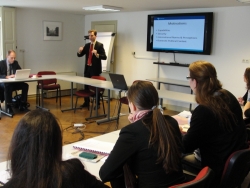Why do States wish for nuclear weapons, or not? What are the aims, motivations and incentives to create and maintain such weapons of mass destruction? Do nuclear weapons create security? Are they practical? How does (non) proliferation work? And what can we do to make our world a nuclear-weapon-free world?
By Nicander van Duijn*
We, the IKV Pax Christi Nuclear Diplomacy Team, will attempt to find the answers to the questions above. The Nuclear Diplomacy team consists of ten Dutch students with a passion for international relations, security and disarmament. IKV Pax Christi, a Dutch peace organization, has offered us the opportunity to participate in a crash course in nuclear diplomacy to learn about the history, present, and future of nuclear weapons. Our standpoint is clear: there is no future for nuclear weapons.
But how can we reach the goal of a nuclear-weapon-free world? To educate ourselves on this topic, we will talk with nuclear scientists, international diplomats and policy experts, supported by IKV’s research materials. The aim is to create an effective lobbying force to participate in the Preparatory Committee (PrepCom) of the Non-Proliferation Treaty (NPT) of the United Nations in Geneva. After a week of lobbying at this international conference, the aim is to share our knowledge on nuclear disarmament through organizing national events and meetings on the issue.
The first of our Nuclear Diplomacy training days was held at the Clingendael Institute of International Relations. Sico van der Meer, Clingendael, and Niels van Willigen, Leiden University, educated us on the motivations of States to ‘go nuclear’, as well as the history of international treaties regarding nuclear technology. Security is often cited as the main motivation of States to aspire nuclear weaponry. However, we learned that a State’s capabilities (nuclear weapons are expensive and hard to make), international norms and perceptions (what will happen if other States find out?) and the domestic political context (lobbying by military ‘hawks’, or nuclear weapons as a means to divert attention away from domestic issues) matter just as much in a State’s reasoning to attain these weapons of mass destruction. Our first session introduced us to the contradictions of the nuclear debate, historical initiatives and possible future developments. It was an informative day, encouraging us to delve deeper into the nuclear debate.
The upcoming weeks will be challenging and rewarding, and hopefully prepare us in the best possible way to become nuclear diplomats, to challenge the nuclear status quo. Because the approximately 19.000 nuclear weapons in this world can do only harm, no good.
There is no future for nuclear weapons.
*Nicander van Duijn is a Pre-Master student Conflict Resolution at University of Amsterdam & Radboud University Honours Program and one of the Nuclear Diplomacy Crash Course students of this year.

